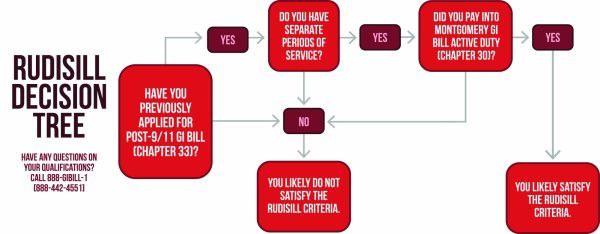Military veterans qualify for an extra year of paid tuition, thanks to a Supreme Court ruling a year ago this month.
The Ruling in Rudisill v. McDonough gave many vets an additional 12 months of paid education benefits or a $1,200 refund of their Montgomery GI Bill (MGIB) contribution. Those with multiple qualifying periods of service will receive up to 48 months of combined benefits under the MGIB and the Post-9/11 GI Bill.
At EvCC, the impact of this decision is still unfolding. Michael Zuniga, the school’s veteran education certifying official, noted, “Most student veterans haven’t even heard of Rudisill. I recommend everyone with multiple service periods just apply. The worst they’ll hear is no.”
Eligibility and application
Veterans who served at least two separate periods of active duty — qualifying them for both MGIB and Post-9/11 GI Bill benefits — may now access a combined total of 48 months of education benefits. This is a significant increase from the previous cap of 36 months.

How to check your GI Bill eligibility and request a Rudisill review
Understand the Rudisill decision:
Visit the VA’s official Rudisill decision page to review eligibility criteria and implications of the ruling.
Submit VA Form 22-1995: Access the form online at VA Form 22-1995. When completing the form, ensure you select the option indicating your request is related to the Rudisill decision. In the remarks section, you may write: “Requesting Rudisill review for additional GI Bill eligibility based on multiple qualifying service periods.”
Seek assistance if needed: Contact the VA Education Call Center at 1-888-GIBILL-1 (1-888-442-4551), available Monday-Friday, 7 a.m. to 6 p.m. CT. A representative can guide you through checking your Certificates of Eligibility (COEs) and submitting the 22-1995 form.
Important considerations:
If your last education claim decision was on or after Aug. 15, 2018, the VA will automatically review your eligibility; no action is required.
If your last decision was before Aug. 15, 2018, you must submit VA Form 22-1995 to initiate a review.
The deadline to apply for a new expiration date recalculation is Oct. 1, 2030. After this date, standard delimiting date rules will apply.
It’s important to note that the MGIB provides a flat-rate monthly stipend for full-time enrollment, paid directly to the veteran. Unlike the Post-9/11 GI Bill, it does not include separate housing or book allowances and does not pay schools directly.
Additionally, the MGIB is not transferable to dependents. Only the Post-9/11 GI Bill allows for the transfer of unused benefits to spouses or children, and this must be done while the service member is still on active duty.
Challenges in implementation
Despite the ruling, the VA has faced criticism for its handling of the decision’s implementation. Many veterans report that their COEs have not been automatically updated, and information from VA representatives has been inconsistent.
“I haven’t seen a single student at Everett Community College receive an updated COE that reflects the Rudisill decision. Students are applying, but we’re still early in the process—and the VA hasn’t communicated much about what to expect,” Zuniga said.
The VA has not provided clear answers to several critical questions, including:
Why haven’t COEs been automatically updated to reflect Rudisill eligibility?
Why is the requirement to submit VA Form 22-1995 for a Rudisill review not more clearly communicated to eligible veterans?
Will veterans who have already separated from service ever be allowed to transfer unused education benefits to their dependents?
Is the VA currently tracking how many eligible veterans are receiving the full 48-month entitlement?
What steps are being taken to ensure consistent communication from VA representatives regarding Rudisill-related benefits?
“Unfortunately, it seems that we won’t be able to obtain a VA statement anytime soon,” Joseph Williams, a public affairs specialist with the Department of Veteran Affairs, wrote via email.
“To provide you with the most accurate and valuable information, we need further clarification from senior leadership on this matter, which… is not looking like they will address it any time soon.”
Looking ahead
While the Rudisill decision offers expanded opportunities for veterans, the path to accessing these benefits remains fraught with challenges. Veterans are encouraged to proactively seek information and assistance to ensure they receive the benefits they’ve earned.
For support, EvCC’s Veterans Resource Center is available to help navigate the application process. Additionally, veterans can reach out to the GI Bill hotline or visit the VA’s official website for more information.
Join the conversation
Have you received your extra GI Bill time under Rudisill? Still waiting? Denied without clear explanation?
We’re collecting testimonials for next year’s update to ensure accountability — and to help fellow veterans navigate the system.
Drop a comment, send a direct message or email [email protected] if you’re willing to share your story.
Review your eligibility:
Log in to va.gov or open the Department of Veterans Affairs (VA): Health and Benefits app.
Navigate to the “Education & Training” section to view your Post-9/11 GI Bill benefits.
If your COE indicates only 36 months of entitlement, but you served under both GI Bills, you might be eligible for an additional 12 months.














Travis Wierenga • May 2, 2025 at 2:33 pm
I had no idea!